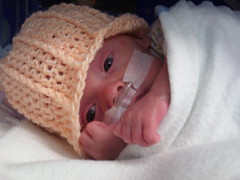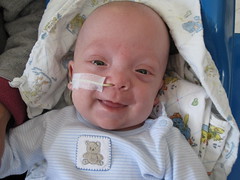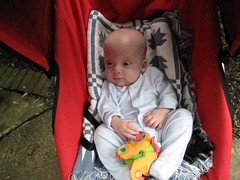Since last December, PO feeds for Max have gained greater and greater prominence. While he was still at Georgetown, the NICU team told us that to leave the hospital, Max would have to be able to stay warm in an open crib with just a blanket, weigh more than 1,800 grams, and be able to feed himself PO in less than 30 minutes. The NICU team warned us that Max might go home with an oxygen tank and a monitor, but that they didn't send babies home with ng tubes. We didn't focus too much on Max's ability to feed himself PO; after all, we learned that the suck reflex didn't develop until the 32nd or 34th week of gestation anyway, so no-one expected Max to feed himself in those early days.
And back in that wintry season Max had many other immediate problems; I would scrub in at the NICU's big sinks and stare through the glass at the little astronauts, more often than not seeing the NICU team huddled around Max's isolette-cum-space capsule as they considered his latest alarming symptoms. Max battled almost every single woe that could afflict a NICU resident: NEC, hydrocephalus following brain hemorrhages, chronic lung disease and some kind of heart murmur. I didn't pay attention to the tiny little tube running into his nose, held in place with a small bit of tape, often cut in the shape of a heart by the Georgetown nurses.
Several months later, after he had shaken everything but his reflux, we learned that many parents were deemed capable to handle infants with ng tubes, or even more serious feeding systems such as nd or nj tubes. And in the months since he's come home we've mainly focused on his reflux. Medical adjustments, surgical consults, speech therapists, and occupational therapists have all given their professional advice. But Max's progress was halting at best. He frequently vomited. He wasn't good at PO feeding.
So it was that Carolyn and I had resigned ourselves to a holding action until Max was old enough to meet one of the criteria for one of the surgeries that purported to cure reflux (all of which have at best mixed success rates). The problem is that the connections between Max's brain and big parts of his body were scrambled by the damage his brain sustained early on. His problems eating, holding food down, sitting, relaxing his leg muscles and turning over are all related. Max's brain knows that his esophagus and stomach need to tighten up, and it's shouting at the top of its metaphorical lungs, but the trunk (including stomach and esophagus) can't hear. All the rest of Max's body is getting the message loud and clear, leading to his generally stiff tone. And of course there's no surgery or medicine that can repair the crossed and damaged wires between Max's brain and his muscles.
But now, for the first time in many months, Carolyn and I are considering whether to allow ourselves a measure of hope. Max has started showing off some control of his core body muscles. He's sitting up with minimal assistance. He's started flipping from his stomach to his back and vice versa. And, most remarkably, he's showing unmistakable signs of developing PO feeding skills. Not only is his daily PO volume increasing, today he spent some time with his friend O., a baby of similar age, and ate O.'s prunes.
I don't want to dwell too much on this point, but Carolyn and I are tough now in a way we could never have imagined a year ago. We can take devastating news from a neurologist and laugh, literally laugh, at his discomfort. But I had forgotten how good news, and the hope it tries to spark, can slip past our defenses and leave us open to intense emotional turmoil. Could it be that Max has turned a corner? That he may again have escaped the surgeon's knife? Carolyn and I will always bet on Max. In the end, we are helpless not to hope that Max has finally gotten through to his stubborn trunk muscles.
Here is a graph of Max's PO feeding volume.





